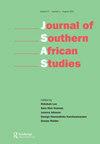“萨坦比奇停止偷我们的钱”:赞比亚矿工与金融的斗争
IF 0.7
4区 社会学
Q2 AREA STUDIES
引用次数: 1
摘要
本文探讨了赞比亚矿工如何利用法庭和抗议活动来抵制斯坦比克银行的掠夺性贷款。鉴于债务偿还是直接从工资中完成的,这些工人不一定主张拒绝债务或违约。他们也没想到法院会做出有利于他们的裁决。相反,他们试图通过点名和羞辱银行来抵制银行对贷款条款的任意修改,强调他们就业的不稳定,并利用执政党对矿工投票的绝望情绪来推进他们对国家的主张。这篇文章展示了负债工人在与金融资本的斗争中如何将债务抵抗和对国家的公民身份要求结合起来。它借鉴了36 2016年至2021年间,在赞比亚铜带穆富拉和基特韦的矿工及其家人中进行了数月的民族志研究。本文章由计算机程序翻译,如有差异,请以英文原文为准。
‘Satanbic Stop Stealing Our Money’: Zambia Mine Workers’ Struggles against Finance
This article explores how Zambian mine workers used the courts and a protest campaign to resist predatory lending by Stanbic Bank. Given that debt repayment was done directly from their salaries, these workers were not necessarily advocating debt refusal or default. Neither did they expect the courts to rule in their favour. Rather, they sought to resist the bank’s arbitrary changes to the terms of the loan by naming and shaming the bank, highlighting the precariousness of their employment and taking advantage of the ruling party’s desperation for miners’ votes in order to advance their claims on the state. The article shows how debt resistance and citizenship claims upon the state can be combined by indebted workers in their struggles against finance capital. It draws on 36 months of ethnographic research conducted among miners and their families in Mufulira and Kitwe on the Zambian Copperbelt between 2016 and 2021.
求助全文
通过发布文献求助,成功后即可免费获取论文全文。
去求助
来源期刊

Journal of Southern African Studies
AREA STUDIES-
CiteScore
1.40
自引率
0.00%
发文量
73
期刊介绍:
The Journal of Southern African Studies is an international publication for work of high academic quality on issues of interest and concern in the region of Southern Africa. It aims at generating fresh scholarly enquiry and rigorous exposition in the many different disciplines of the social sciences and humanities, and periodically organises and supports conferences to this end, sometimes in the region. It seeks to encourage inter-disciplinary analysis, strong comparative perspectives and research that reflects new theoretical or methodological approaches. An active advisory board and an editor based in the region demonstrate our close ties with scholars there and our commitment to promoting research in the region.
 求助内容:
求助内容: 应助结果提醒方式:
应助结果提醒方式:


